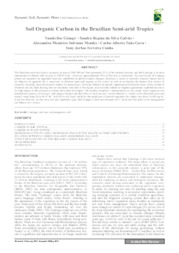Soil organic carbon in the brazilian semi-arids tropics.
Soil organic carbon in the brazilian semi-arids tropics.
Autoria: GIONGO, V.; GALVÃO, S. R. da S.; MENDES, A. M. S.; GAVA, C. A. T.; CUNHA, T. J. F.
Resumo: The Brazilian semi-arid tropics occupies an area of 969,589 km2 that represents 11% of the national territory and the Caatinga is its most representatives Biome with an area of 844.453 km². However, approximately 46% of this area is deforested. The conversion of Caatinga preserved vegetation in degraded areas has contributed to global climatic changes; therefore, a series of scientific research studies has as its objective to quantify the C reservoirs in different semi-arid regions of the world, as well as to identify the factors that control its dynamic. Recently, network research studies for measuring C stock and balance in natural vegetation and disturbed areas, firstly related to livestock and dry land farming that are dominant activities in the region, and secondly related to irrigated agricultural exploitation due to its high impact in the productive system, have been developed. The studies comprise C determination in soil, plant, micro-organism and atmosphere systems, involving C and energy balance and the effect of land use on C stock relations. C stocks in the Brazilian semi-arid tropics varies from 20 to 48.4 t ha-1 at 0-20 cm soil layer, while for the aerial part of natural vegetation the values vary from 1 to 80 mg ha-1. It can be observed, for the same soil and vegetation type, that changes in land use decrease soil C stock and that plant cover management can behave as C source.
Ano de publicação: 2011
Tipo de publicação: Artigo de periódico
Unidade: Embrapa Semiárido
Palavras-chave: Caatinga, Carbono, Matéria Orgânica, Semiárido, Soil organic carbon, Solo, Uso da Terra
Observações
1 - Por padrão são exibidas publicações dos últimos 20 anos. Para encontrar publicações mais antigas, configure o filtro ano de publicação, colocando o ano a partir do qual você deseja encontrar publicações. O filtro está na coluna da esquerda na busca acima.
2 - Para ler algumas publicações da Embrapa (apenas as que estão em formato ePub), é necessário ter, no celular ou computador, um desses softwares gratuitos. Sistemas Android: Google Play Livros; IOS: iBooks; Windows e Linux: software Calibre.
Acesse outras publicações
Acesse a Base de Dados da Pesquisa Agropecuária (BDPA) para consultar o acervo completo das bibliotecas da Embrapa.

